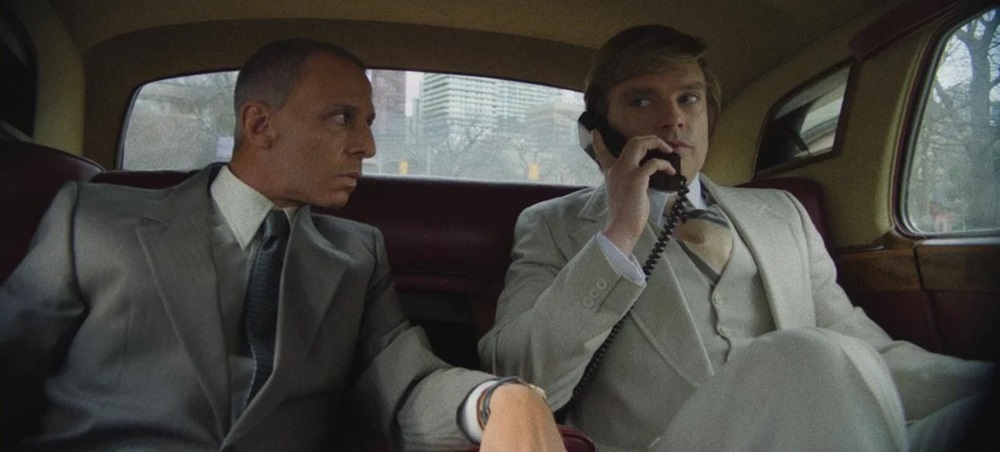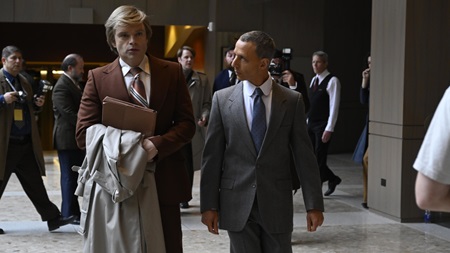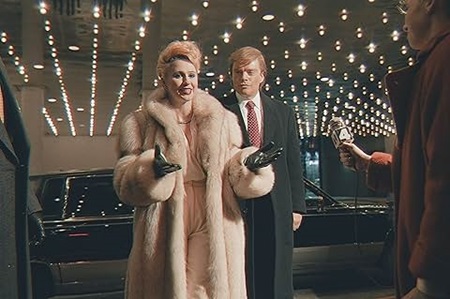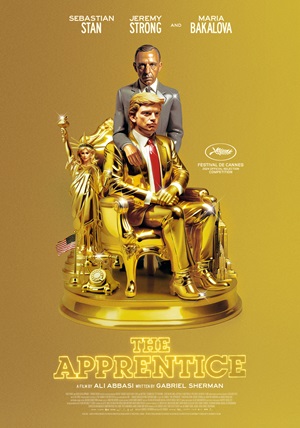
Donald Trump and Roy Cohn Forge a Profanely Ephemeral Alliance in The Apprentice
Maybe it’s appropriate that The Apprentice director Ali Abbasi (Border) has made something so perplexingly frustrating, yet still aggravatingly mesmerizing, out of the relationship between young New York real estate developer Donald Trump and firebrand lawyer Roy Cohn. Even though it never felt like I was learning anything new about the blossoming megalomaniac (and future US president), I could not pull my eyes away from the screen. Watching this man (monster?) come into his own was upsettingly captivating.
In the script written by journalist and Roger Ailes biographer Gabriel Sherman, Trump’s vapid emptiness is displayed directly parallel to Cohn’s ferociously unrestrained carnivorousness. While it’s never clear what it is that draws the latter to become the former’s mentor, the electricity generated between the two, at least early on, is nevertheless undeniable.
As portrayed by Emmy winner Jeremy Strong, Cohn is an unredeemable piece of human excrement. Yet somehow, someway, he manages to bring an odd, disquieting humanity to the man, and it’s wholly believable how such a tyrannical figure could spew virulent homophobic sound bites while at the same time hedonistically living it up with his live-in “assistant” Russell (Ben Sullivan). Strong is mesmerizing, and it’s a shame the film’s second half (when Trump began to distance himself from the lawyer, especially during the height of the AIDS crisis) doesn’t do more with him. Still, a scene at Cohn’s birthday party toward the end is bone-chilling, due to the emotional permutations the actor goes through as it becomes clear the apprentice has surpassed the master, and the only thing left for him to do is take a polite bow and find a quiet place to die.
Sebastian Stan tackles Trump, and for a public figure who has been celebrated, pitied, pilloried, and parodied (and self-parodied) ad nauseam for decades, that he brings something new to the table is somewhat shocking. But he does. Stan showcases the lifeless internal forces that shaped the developer into the unapologetic cretin he would become. He brings a dead-eyed focus to Trump that’s depressing. The idea that this empty vessel of a human being — and frequent failure in life and business — could craft an illusion of prosperity, wealth, and acumen that the public would eagerly embrace and celebrate is far more terrifying than anything Art the Clown does in the entirety of the latest Terrifier installment.
Some will applaud Abbasi and Sherman for so resolutely refusing to take a concrete stand. At least, that was how I read things. It’s as if they want to preach to both choirs: those who hate Trump with a ceaseless passion, as if he were the actual Antichrist, as well as those who hang on every one of his meandering, nonsensical words as if he were a messianic figure come to lead them to salvation.
It’s a tricky balancing act, and one that doesn’t always fit with the images (especially during the picture’s second half) that Abbasi and cinematographer Kasper Tuxen (The Worst Person in the World) choose to emphasize with such documentary-like precision. These include Trump’s infantile outbursts, his casual dismissing of brother Freddy (Charlie Carrick) when he apparently needed him the most, his casual revulsion when he learns Russell is dying of AIDS, and his reported (if subsequently denied) sexual assault on first wife Ivana (Maria Bakalova).
That these moments (and more like them) are part of the story isn’t the issue. Instead, it is the almost blasé way Abbasi chooses to platform them. They’re all strangely benign facets of Trump’s history, nothing more, and certainly nothing less. They don’t provoke an emotional response, and because of this, they become like background noise that only adds ephemeral highlights to his journey and not essential building blocks that formed his foundation.
But maybe that is exactly the point. Trump took Cohn’s three rules (1. always attack, 2. admit nothing and deny everything, 3. claim victory and never admit defeat) and revolved his life around them. They become his bedrock principles. In The Apprentice, doing this appears to transform Trump into a cipher, a shapeless phantasm who shifts who he is and what he’s all about from moment to moment. If that’s not an unsettling metaphor for the reality we’re all stumbling through right now, I’m not sure what else would be.
– Review reprinted courtesy of the SGN in Seattle
Film Rating: 2½ (out of 4)








